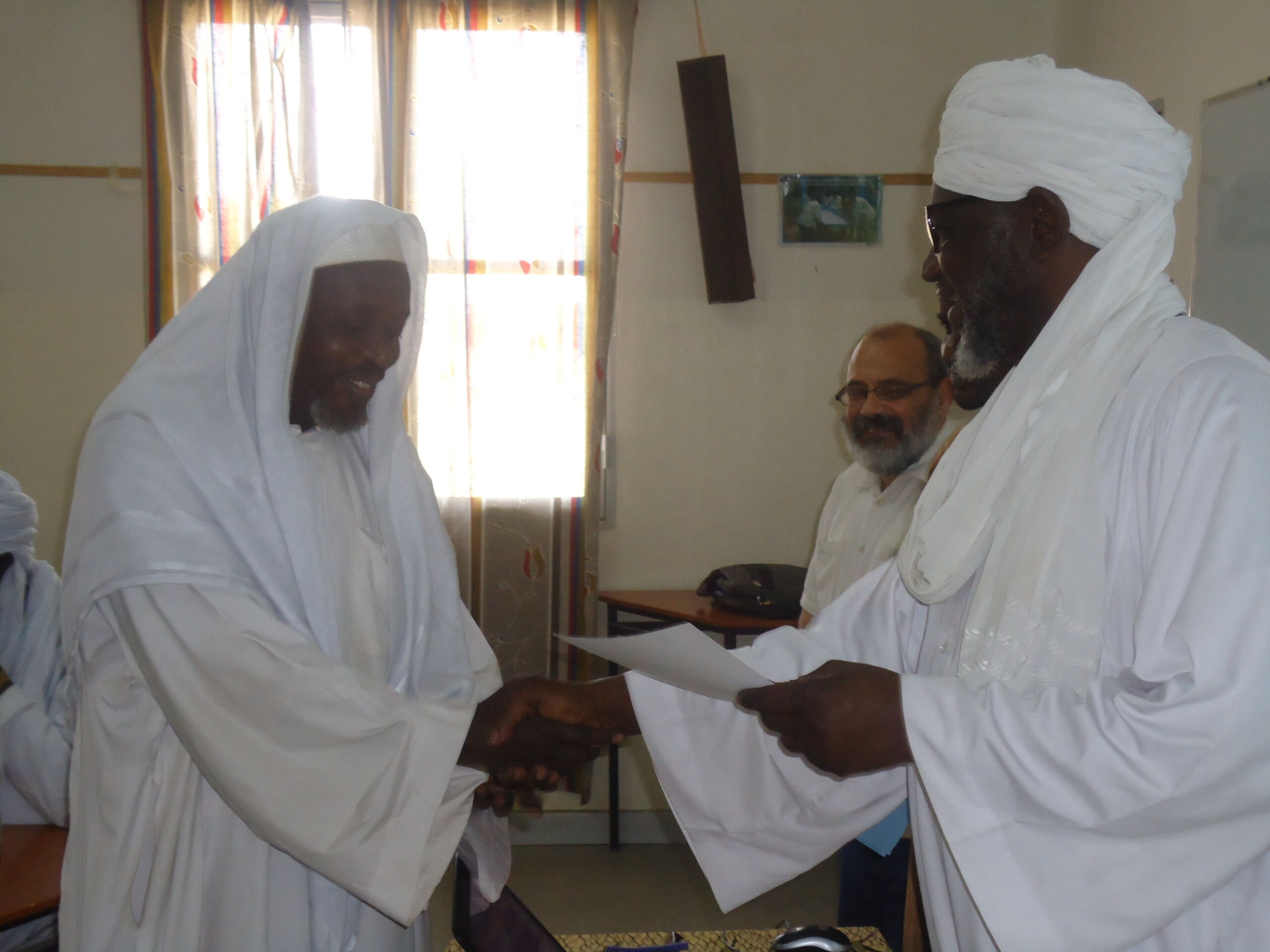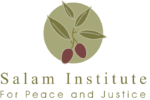Within the context of educational reforms and capacity building of Arabic schools in Chad, civic education for peace and diversity has been identified as a tool to prevent ethnic and religious tension and to enhance existing practices of tolerance and coexistence. The cultivation of divisions between ethnic groups, which is prevalent within the education system, needed to be directly addressed to foster lasting peace and mutual understanding. In 2010 and 2011,the Salam Institute was a partner in the USAID-funded Peace through Development Iprojectin Chad and Niger implemented by the Academy for Educational Development. As part of this project,the Salam Institute executed five complementary projects:
- Introducing Civic Education for Peace & Diversity in ISESCO’s Arabic Schools in Chad.
- Building local capacity in Inter-FaithDialogue in Chad.
- Training of Trainers for Imams in Peacebuilding and Conflict Resolution in Chad.
- Introducing Civic Education for Peace & Diversity in Nigerien Quranic Schools.
- Regional Conference to Support Reform and Modernization of Nigerien and Chadian Quranic Schools.
Through these activities, The Salam Institute’s goals were to:
- Help transform the educational experience of Muslim youth and adults living in Chad;
- Introduce context-appropriate methodologies for teacher training in the Arabic educational system in Chad;
- Develop materials that support peace, tolerance and moderate messages in the Chadian civic education curriculum;
- Provide technical assistance, guidance, and materials to help with the development of new and engaging ideas, relevant themes and content for peacebuilding conferences in Chad;
- Train imam trainers on how to incorporate peace and conflict resolution skills into their teachings and disseminate messages of tolerance in Chad; and
- Work with local organizations in Niger to build the capacity of local teachers and leaders of Quranic schools in pedagogical approaches, particularly as they relate to developing students’ critical thinking skills and incorporating into pre-existing curriculum considerations of religious tolerance and human rights.
Introducing Civic Education for Peace & Diversity in ISESCO’s Arabic Schools in Chad
Why is supporting civic education in Chad so important? Today, according to the UNDP index, the educational system in Chad is one of the least developed in the world. It is one of the fifteen countries identified in Africa with less than 50% of enrollment rate. The lack of textbooks, poor infrastructure and limited number of qualified teachers are some of the problems associated with the educational system in Chad. As noted by NomayeMadana, Director General of the National Center for Curricula, only 30,000 books have been printed for 2.5 million students and these books are mostly used by teachers rather than the students. According to Mr. Ali Adam Abderrahman Abaid, Managing Director at the Chadian Ministry of Education, illiteracy rate among Chadians today is 57% while this rate is 78% among women.
The Salam Institute has worked with the Chadian office of the Islamic Educational, Scientific and Cultural Organization (ISESCO) to incorporate messages of peace and tolerance into the existing curriculum and training teachers on implementing the curriculum through a detailed and contextually-based training module. During the entirety of this project, the Salam Institute emphasized the importance of new frameworks for approaching civic education in Chad that respect cultural, traditional, and Islamic values.
Following an in-depth assessment of the needs of the ISESCO trainers, school teachers and students, both the revised curriculum and training module was designed to focus on the following aspects: citizenship, equality, peaceful coexistence, peace and tolerance and work ethics.After presenting (1) the developed training module and (2) the recommendations for curriculum reform, the Salam Institute received detailed feedback and was able to reach a joint agreement with ISESCO staff and teachers on the structure, methodology, and content of the module. The Salam Institute then led a Training of Trainers with the purpose of introducing and utilizing the module and disseminating the new curriculum to ISESCO experts and local teachers. The methods, strategies, participatory exercises, and evaluation techniques in the module that complement the curriculum topics were expanded upon during the training.
Building Local Capacity in Inter-faithDialogue in Chad
Why is supporting inter religious peace so important in Chad?Since its independence on August 11, 1960, Chad has been struggling with civil war and unrest. Most recent conflicts in the northern and eastern parts of the country have had devastating effects on this country. Additionally, the conflict in the Darfur region of Sudan profoundly impacts the existing unrest in Chad. However, the majority of the existing tensions and instability in Chad is rooted in its decade’s long conflicts, recurrent invasions by Libya and the unstable ethnic/political power dynamics of the country. Many regimes have tended to favor an “Arabization” of education and policy of tribal favoritism, combined with use of force to subdue opposition. This has increased the inequality between different ethnic communities and deepened the gap between them, leading to more resentment.
The Salam Institute has provided technical assistance tothe Association de Dialogue entre les Jeunes de Diverses Religions (Association for Dialogue between Youth of Different Religions-ADJR) to support their efforts towards initiating a series of inter-religious conferences. Founded in November 1994, ADJR aims to foster peaceful coexistence, tolerance, forgiveness, and dialogue in a climate of animosity among religious groups. Believing that religious-based dialogue is essential for peace and co-existence in Chad, ADJR has organized awareness-raising and advocacy events on topics such as religion and peace, religion and human rights, religion and tolerance, and coexistence of Muslims and Christians. ADJR also hosted a series of events with students from high schools and organized discussions on the role of religion in bringing people closer. Acknowledging the important contribution that ADJR makes towards bettering relationships among various ethnic and religious groups in Chad, the Salam Institute was eager and excited to offer its expertise to help ADJR fulfill its mission. The first conference that the Salam Institute was able to observe was an interfaith conference with the objective of creating a space for Muslim and Christian youth to come together to discuss interfaith relations and to disseminate messages of tolerance, peacebuilding and dialogue between Muslim and Christian communities. A total of sixty seven (67) participants, men and women aged 18-34, from various regions of Chad attended the conference.
After the initial pilot conference, Salam worked with ADJR at integrating the relevant ideas, concerns, and issues into the development of a second customized conference, entitled “Strategies and Tools for Effective Implementation of Interfaith Dialogue and Peaceful Coexistence.” The conference included lectures from Salam staff and various other components based on the earlier recommendations, such as: skills-building workshops, film screenings, plenary sessions, and panel presentations from various local stakeholders.
This process culminated in the building of a local cadre of youth facilitators in interfaith dialogue, through a five-day training workshop for 15 youth leaders hailing from various regions of Chad.
Training of Trainers for Imams in Peacebuilding and Conflict Resolution in Chad
The Salam Institute worked with the Supreme Council of Islamic Affairs and the Union of Imams in Chad to train a selected group of Imam trainers to incorporate messages of peace, tolerance,coexistence and pluralism into their educational and outreach activities. Through two five-day training workshops, the Salam Institute worked with these institutions to:
- Develop messaging platforms on topics such as conflict resolution, coexistence, pluralism, tolerance, and intra-faith dialogue;
- Organize and conduct training workshops that gives the imam trainers practical experience on delivering key messages on intra-faith dialogue, conflict resolution, and pluralism;
- Develop a set of guidelines on how to train youth and other religious leaders in Islamic peace education.
Introducing Civic Education for Peace & Diversity in Nigerien and Chadian Quranic Schools
Why is supporting Nigerien Quranic schools so important? Since 2009, the country has been governed by a military transitional government. It is one of the poorest countries in the world. According to the Human Development Index, Niger ranks 163 out of 169 countries when comparing health, education and income. Heavy reliance on agriculture coupled with frequent droughts in the sub-Saharan and Sahel region makes Niger particularly unstable. According to the Ministry of Education in Niger, the educational system is organized into three major sub-components: formal education, non-formal education, and informal education. In general, the enrollment rate in educational institutions is very low; not exceeding 41.7 percent while the overall literacy rate is only about 19 percent. Moreover, only a third of children receive basic education. The booming number of non-formal educational institutions complicates this situation; the number of Quranic school schools is estimated at 50,000. Furthermore, in Quranic schools, the student teacher ratio is around 100:1.
The Quranic school system in Niger is often plagued by a dearth of qualified teachers, learning equipment, proper lesson plans, and training. In October 2010, the Salam Institute conducted a thorough assessment of the Quranic school educational system in Niger. Several key stakeholders were consulted, including the Nigerien Ministry of Education; Union des Écoles Coraniques du Niger (Union of Quranic Schools of Niger-UECN) representatives, local administrators, teachers and students. In addition, meetings were also held with local and religious leaders. Based on this assessment, a manual was created in cooperation with UECN for the purpose of educating and training future Quranic schoolteachers on integrating concepts related to human rights, tolerance, pluralism, coexistence, and peaceful resolution of conflicts into preexisting Islamic based curriculum. The manual was presented to the teachers and a training was held in March 2011. The Quranic school teachers were given the opportunity to review the curriculum and participate in skills development and community outreach workshops to help disseminate the concepts into their immediate environment.
Regional Conference to Support Reform and Modernization of Nigerien and Chadian Quranic Schools
In May 2011,Salam Institute organized and hosted a three day regional conference in Niamey, Niger to support reform and modernization of Quranic schools in the region. The conference offered an opportunity to build on the capacity building experience Salam Institute had previously worked to developin Chad and Niger. The conference sought to create a platform for cross-fertilization and sharing of experiences between local and international professionals and experts interested in the reform and modernization of Quranic schools, especially in regards to integrating values of peace, diversity, tolerance and coexistence in the curricula in order to effectively make these schools viableactors capable ofbuilding cultures of peace. It also aimed to draft a tentative road map for sustained capacity building and support to Quranic schools on how to integrate values of peace, diversity, tolerance and coexistence into their curricula.
The Peace through Development I program was generously funded by USAID and implemented by the Academy for Educational Development in partnership with the Salam Institute for Peace and Justice,and Equal Access International.

